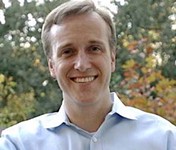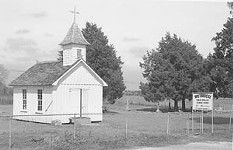Keeping the Faith
Women lawmakers endure – and defy – the anti-choice wrath of the Catholic Church
By Jordan Smith, Fri., April 6, 2012
Dawnna Dukes' great-grandmother was a French Creole. She came to Austin from Louisiana in 1914 and found herself among a growing number of black Catholics without a house of worship. Austin's white parishes wouldn't allow black congregants, so Dukes' great-grandmother joined with a group of like-minded souls to help found Holy Cross Catholic Church, the city's historically black Catholic parish on East 11th Street. The small congregation eventually became a local political powerhouse; in 1940, Holy Cross Hospital was built on the church grounds, and a year later, Holy Cross Catholic School was established. In the Seventies, Meals on Wheels and More was founded by Holy Cross volunteers, who used the church basement to start the successful charity. The parish was spiritual home to the city's first black City Council member, two Austin ISD board members, and two state representatives, including Austin Democratic state Rep. Dukes.
It was within the powerful confines of Holy Cross Church that Dukes grew up. She was baptized and confirmed there, and the church has married and buried most of her kin. So when Dukes was asked to serve as a guest speaker at the parish after services on the third Sunday in February for Black History Month, to discuss the contributions of black women, she was happy to oblige.
But Dukes never spoke; instead, a week before she was scheduled to appear, she was informed that the Catholic Diocese of Austin had determined that she would not again be allowed to address the congregation – specifically because of her ongoing support for Texas' Women's Health Program, a Medicaid-waiver health care program that aims to reduce unintended pregnancies and to provide basic health care for low-income, uninsured women. "I am a child of Holy Cross," Dukes said recently. And now, she says, "I've been banned."
Church Doctrine vs. Women's Lives
Dukes is among a group of public officials nationwide who have been called out – either privately or publicly – by the Catholic Church's hierarchy for their positions on women's issues, and specifically, for being pro-choice and for supporting access to birth control. According to Sara Hutchinson, domestic program director of Catholics for Choice, a progressive Catholic public policy organization supporting women's health and reproductive rights, the church's hierarchy, led by the U.S. Conference of Catholic Bishops, has since 2009 placed reproductive choice – no matter the context – at the top of its list of issues to oppose. In fact, Hutchinson says, the bishops were willing to oppose national health care reform – with its promise to provide millions of people with access to affordable health care – precisely because of the "small possibility" that access to legal abortion "wouldn't be restrictive enough." Rather than "falling back on the social justice issues," socioeconomic or otherwise, for which the church has traditionally advocated, the church has instead ratcheted up its rhetoric against any form of birth control.
Its vocal opposition to birth control and reproductive choice has grown even louder since the U.S. Department of Health & Human Services last year announced a new rule that would require health insurance plans to cover birth control. Although the new rule exempts churches, it does not exempt other Catholic institutions such as colleges or hospitals, and the Catholic leadership has cast the regulation as part of a broader assault on "religious liberty," describing it as the No. 1 threat to religious freedom. "We cannot waste time in this vital area," Timothy Dolan, archbishop of New York and president of the USCCB, wrote to his fellow bishops in September 2011, because the assaults on "people of faith" have increased, he charged, thanks largely to federal policies "that would infringe upon the right of conscience of people of faith or otherwise harm the foundational principle of religious liberty."
Caught in the middle of the controversy are the millions of Catholics who disagree with the hierarchy's declaration of doctrine that they find largely incompatible not only with the realities of modern life but also with their own consciences and their personal religious liberty. "The reality is, their willingness to go full bore against almost any access to women's choice or access to women's health care has become the number one issue," says Hutchinson, describing an institutional pressure that she says "runs afoul of what most of us [would consider] pastoral care."
More specifically, the hierarchy has increasingly moved to openly reprove or shame public officials who are Catholics – and that's exactly what Dukes believes happened to her. "I grew up in a church that taught me to question," Dukes says, and in a family of "very strong matriarchs. They taught us that you don't just accept something because it's thrown at you like a pancake."
No Room at the Inn
Dukes was not the only local public official prevented from speaking recently at Holy Cross. Sheryl Cole, who serves on the Austin City Council and is the city's Mayor Pro Tem, is not a Catholic but was also asked to speak at the church, on the Sunday before Dukes was scheduled – and she, too, was subsequently disinvited. In Cole's case, moreover, she never received notice of the dismissal before she arrived at the church on Feb. 12. She sat up front but was never acknowledged; her name wasn't on the program, and she was never called to speak. "I was never told why," Cole recalled recently. Later, she says, in a gesture of apology, the church sent flowers.
She didn't "press it then," Cole says, but she has since learned that her longtime support for reproductive choice and women's health care had made her unwelcome. Indeed, Cole had served for two terms on the board of Planned Parenthood and has also voted to support a city ordinance that would require so-called "crisis pregnancy centers" to post notices indicating whether they are licensed to provide any medical care (most CPCs, including those run locally by the Catholic diocese, are not). Of the church's response to her public positions, Cole said, "It's a litmus test."
According to Christian Gonzalez, spokesman for the Catholic Diocese of Austin, that's not precisely the case. In general, he says, administrators of the Austin Diocese, which is headquartered here but encompasses 127 churches across 21,000 square miles of Central Texas, prefer that speakers invited to any parish be precleared by diocesan leadership – a process that is mandatory whenever an event at an individual parish is "advertised" beyond the church to other Catholics or to the general public. Should an individual parish decline to seek approval, as occasionally occurs, the "responsibility" for that decision, Gonzalez says, rests on the church's pastor – which explains why both Dukes and Cole have previously spoken at Holy Cross. For example, in September 2011, Dukes was featured as a speaker at Holy Cross' 75th anniversary celebration – but since that was strictly a parish celebration, the pastor could invite her to speak without asking the diocese for permission. (The diocese still prefers to be asked, Gonzalez added: "It's a good idea.")
The Black History Month speaker series was open not only to all area Catholics, but also to the general public, which is why the diocese became involved in vetting Dukes, said Gonzalez. As Gonzalez understands it, a Holy Cross parishioner invited Cole, and it was the parish that later declined the invitation because of Cole's "stance on Planned Parenthood" and her vote in favor of the ordinance that would have the local Catholic charities post informational signage outside its CPCs. It was unfortunate, he says, that Cole wasn't formally uninvited before she arrived at the church.
Dukes says she was initially called by the church and told that she would not be able to speak because she was up for re-election and the church didn't want to appear to favor a candidate. "I paused," she recalled recently, "and then said, 'but I'm unopposed.'" The diocese still considered her candidacy a problem, said Gonzalez, since although no one had filed to run against her at the time, someone could have done so before the filing deadline and then the church would have felt it necessary to offer her opponent "equal time." "If someone is running for office and gives a talk, then candidate B would be given equal time," explained Gonzalez. "We have to be fair." Ultimately, he acknowledged, it was Dukes' position on women's health issues that made her unwelcome to speak at Holy Cross during Black History Month. As Gonzalez bluntly put it, Dukes' support for reproductive choice, access to birth control and Planned Parenthood "falls on the other side of Catholic teaching when it comes to life issues. When someone [is] in public life with her record of supporting something that contradicts our faith [and is] against our principles and morals," she can't be allowed to speak in the church – on any topic.
Holy Cross personnel declined to comment for this story, referring all questions to the diocese; for her part, Dukes said that no blame for the situation should be placed on her parish. Instead, she lays blame for her public banishment directly at the feet of the Catholic hierarchy, within the diocese and the USCCB.
'Cruel to Gender'
Unfortunately, says Catholics for Choice's Hutchinson, stories like those involving Dukes and Cole are too common. "We certainly have stories, anecdotal stories, of public officials at every level being called out or spoken to" based on positions they have or beliefs they hold that are contrary to the current hierarchy's interpretation of Catholic doctrine – "It goes on regularly." The church hierarchy has long used its "unique relationship and unique access" to Catholic officeholders in order to try to influence their public stances on topics of importance to the church. Hutchinson says while admonishment of Catholic officeholders by church hierarchy is something of a commonplace, in recent years these reprovals have become more public and bold, with at least the tacit approval of the highest Catholic leadership. She says there has been a "march toward strict conservative [interpretation of doctrine] and public embarrassment and calling-out of officials who are representing their constituents" – as they should be, she says – "rather than the church leadership in their policies. There really are some disturbing stories."
Got something to say on the subject? Send a letter to the editor.














